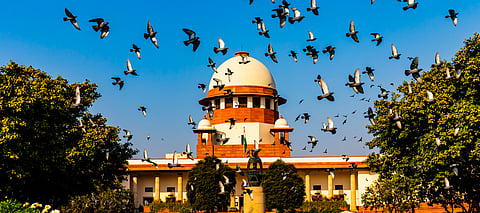

IN a significant decision, a three-judge bench of the Supreme Court on Wednesday held that the application of National Eligibility cumEntrance Test (NEET) to unaided/aided minority institutions for admissions in the graduate and postgraduates courses of medical as well as dental science did not violate their rights to administer the institutions under Articles 19(1) (g) and 30 read with Articles 25, 26, and 29(1) of the Constitution of India.
The court was adjudicating a batch of a petition led by Christian Medical College Vellore Association challenging various notifications and rules made under the Indian Medical Council Act, 1956 and Dentist Act, 1948 in order to prescribe National Eligibility Entrance Test (NEET) as the all-India exam for admissions to graduate and post-graduate medical courses.
Petitioners had contended that notifications issued by the Medical Council of India (MCI) and Dental Council of India (DCI) pertaining to uniform entrance examination for undergraduate and postgraduate level were in violation of the fundamental rights of an unaided minority institution to "establish and administer educational institutions of their choice" protected under Article 30 read with Articles 25 and 26 of the Constitution of India, which includes the right to admit students of their own choice.
Negating the contentions of the petitioners, a three-judge bench comprising Justices Arun Mishra, Vineet Saran and M R Shah observed-
"Uniform Entrance Test qualifies the test of proportionality and is reasonable. The same is intended to check several maladies which crept into medical education, to prevent capitation fee by admitting students which are lower in merit and to prevent exploitation, profiteering, and commercialisation of education. The institution has to be a capable vehicle of education".
They added "The minority institutions are equally bound to comply with the conditions imposed under the relevant Acts and Regulations to enjoy affiliation and recognition, which apply to all institutions. In case they have to impart education, they are bound to comply with the conditions, which are equally applicable to all. The regulations are necessary, and they are not divisive or disintegrative".
According to the apex court, the rights available under Article 30 are not violated by provisions carved out in Section 10D of the MCI Act, the Dentists Act and Regulations framed by MCI/DCI.
The regulatory measures, the court said, were intended for the proper functioning of institutions and to ensure that the standard of education is maintained and did not fall low under the guise of an exclusive right of management to the extent of maladministration.
"The regulatory measures by prescribing NEET is to bring the education within the realm of charity which character it has lost. It intends to weed out evils from the system and various malpractices which decayed the system. The regulatory measures in no way interfere with the rights to administer the institution by the religious or linguistic minorities", said the court.